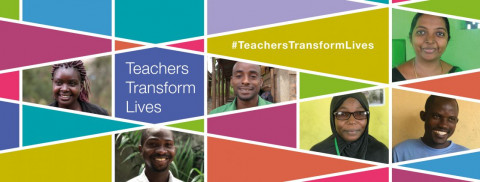
GCED Basic Search Form
Quick Search
You are here
News

Teaching is the most important job in the world; it impacts the growth and prosperity of both communities and nations. The prospects of any country's children cannot exceed the quality of its educators and yet, traditionally, limited focus has been placed on ensuring that all educators are equipped to succeed.
It matters because it is universally agreed that we need to tackle the learning crisis for the one in two children being failed around the world who do not even pick up the basics of literacy and maths. The global Education Commission estimates that there as many as 600 million children in school struggling like this. This objective – Sustainable Development Goal 4 – underpins many of the other development goals. Teacher quality is the most important determinant of learning outcomes, but in many countries teachers are in short supply, isolated or not adequately supported.
The good news is that this is increasingly becoming a focus for governments, investors, donors and multilaterals. Some leaders have already found innovative and low-cost ways to turn this around swiftly and at scale, but these flagship programmes are few and far between.
Teachers under siege
In many low- and middle-income countries, teaching is an extremely difficult profession. Once trained, teachers can find themselves working in a range of challenging situations: days away from the nearest town; little or no support or guidance; textbooks that aren’t aligned to the material or the age of the children they are attempting to teach; overcrowded classrooms with children sitting on the floor.
Compounding all this is the sad truth that many teachers themselves often struggle with the content they are teaching; literacy and numeracy can be a challenge. In several sub-Saharan Africa countries, the average teacher does not perform much better on reading tests than the highest-performing Grade 6 or 12-year-old pupil. According to the World Bank report, teachers in low- and middle-income countries often lack the skills or motivation to teach effectively. The Education Commission notes that teachers currently only spend 45% of their time delivering instruction in the classroom. This lack of quality teaching results in poor outcomes, higher drop-out rate and long-term out-of-school children.
Ultimately, the quality of education delivered is tied to how well a teacher is set up to succeed in his or her classroom. The status quo the world over is that teachers are often held accountable for outcomes without always being given the support and coaching they need to develop and grow their practice.
Pockets of best practice
Putting in place an ongoing support structure for teachers is vital. Helping them to create child-centred classrooms that focus on narrating the positive and fostering child-teacher relationships alongside access to grade-appropriate and carefully designed content are some of the ways that this can be done.
One great example of where this is already happening is Edo state, Nigeria. There, across that whole state, thousands of government teachers have been upskilled and retooled. The impact on children’s learning has been significant. The initial analysis suggests that being in an EdoBEST school equates to nearly three-quarters of a year more maths instruction and nearly two-thirds of a year more literacy instruction compared to a normal Edo primary school. These are government teachers whose teaching effectiveness has been transformed through a tripartite programme of materials, support and development.
This is a state in Nigeria where tens of thousands of children were out of school, where 60% of people live on or under the poverty line. It has been such a fast, large-scale impact it caught the eye of the World Bank and the Education World Forum as a case study for innovation.
The governor who is leading this programme, Godwin Obaseki, had the vision and wisdom to understand that using a non-state actor, Bridge, as a technical partner was a powerful way to quickly up the quality of education for all children in free state schools.
It is not only in Edo that this transformation is taking place. In Liberia, the same approach to teacher training and support in the public school system has seen an exponential increase in learning outcomes as part of a published RCT. Over the course of just one year, learning gains increased by 60%. Thanks to a comprehensive training package, support and resources were made available as part of the government’s transformative LEAP programme, which had teacher training and support at its core.
New campaign
The new #TeachersTransformLives campaign builds on the transformation seen in these programmes, and advocates for better training and support for all teachers so that every teacher can succeed in the classroom. For example, this story of a teacher in Nigeria called Cecilia shows how one woman is having a big impact on her students.
Fundamentally, we need to make sure that every teacher succeeds no matter how remote, isolated or impoverished their school and community. It’s possible for them to succeed with the right support and turn their classrooms into springboards for success in low-income communities anywhere in the world.
URL:

